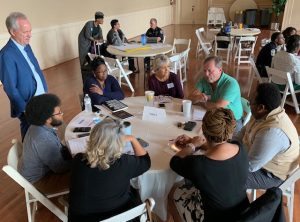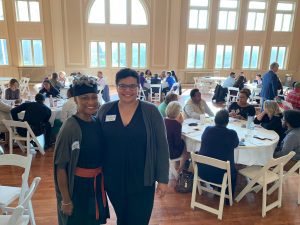Mayor Greg Fischer and the Louisville Metro Police Department have called upon the community-building expertise of staff and faculty members at Spalding University to assist in a key initiative to improve relations between the police and residents in Louisville.
Chandra Irvin, Spalding’s Executive Director of Peace and Spiritual Renewal; Janelle Rae, Director of Inclusive Engagement; and Dr. Steven Kniffley, Assistant Professor in the School of Professional Psychology and the Associate Director of the Center for Behavioral Health; are members of the project management team of the city’s Synergy Project, a year-long program designed to bring police and residents together to discuss ways to strengthen their relationship. The Synergy Project is part of the city’s Lean Into Louisville initiative.
The public is invited to Spalding’s campus on Tuesday, Dec. 17 to learn about the Synergy Project and join the discussion. Spalding will host a public action session – a guided conversation in which residents can communicate and share ideas directly with police officers – from 6-7:30 p.m. at the College Street Ballroom, 812 S. Second St. It’s one of several action sessions that will take place around town in the coming year.
“When people talk about an issue that’s going on, they’ll say, ‘What can I do?’ (Participating in Tuesday’s action session) is definitely something you can do,” Irvin said.
Synergy Project Public Action Session
When: 6-7:30 p.m., Tuesday, Dec. 17
Where: College Street Ballroom, 812 S. Second Street
In the News | Courier Journal feature on the Synergy Project

The Synergy Project is intended to explore the tensions that exist between the significant societal values of public safety and individual rights and determine how to create and maintain a balance between the two, according to the city. Synergy will explore these tensions in order to mobilize actions for city-wide systemic change so every person in every part of the community can thrive.
The Synergy Project is modeled after The Illumination Project, an initiative undertaken in Charleston, South Carolina, after the 2015 hate crimes at Emanuel AME Church.
Irvin helped develop the Illumination Project, which also was a year-long program in which dozens of facilitated community conversations were held to discuss tensions between police and residents. At the end of the year, a strategic plan was unveiled, which continues to be revised and implemented today.
“There are lessons that we learned in Charleston that helped to inform how I am viewing and receiving feedback here,” Irvin said. “What I know is important is that we lean into the tension rather than leaning away from it. Really, that’s the only way that we’re going to connect in very genuine ways because clearly we don’t all have the same experiences and we don’t all think the same way.”
Irvin has helped the Synergy Project use a “polarity” framework that recognizes and values people’s different points of view. It’s an approach that Irvin, Rae and others at Spalding have used to foster meaningful conversations on campus about a range of issues.
“We want to bring people together despite differences – and actually invite differences – so that we can learn from one another and learn how to move to greater places with one another,” Irvin said.
The Synergy Project is bringing together individuals from all parts of the community – residents, academia, business, youth, faith-based organizations, law enforcement, and political leaders – in hopes of creating an opportunity for police and community to work together in a safe, open and respectful environment. The project hopes to identify root causes of distrust and find actionable solutions to move the city forward.
Irvin and Rae are helping to devise and carry out the programming and guided discussions of the Synergy Project. Kniffley, meanwhile, is researching and collecting data, along with Spalding Doctor of Clinical Psychology students Carson Haynes and Heather Dombrowsky.

“This is a great example of a way to change the world,” Rae said of Spalding’s involvement. “Doing this work with the community and on behalf of community is in line with our Spalding mission. It’s our mission to embrace diverse people, and it’s our mission to create peace and promote social justice and to be of service in our communities. A big piece of this is learning from one another, learning about each other’s experiences so that we can actually be a connected community.
“I think it makes sense with our mission to train more and more people to engage productively with each other.”
Kniffley said that as a citizen of Louisville, he felt it was important to be a part of the Synergy Project.
“But then specifically as an African-American male,” he said, “just recognizing that there has always been tension between communities of color, specifically black communities, and law enforcement, to be a part of the effort that’s going to create a more meaningful relationship between the groups, I’m happy to be a part of that. Our goal is to use meaningful conversations that lead to actionable, tangible recommendations that the steering committee will then vote on and formulate into our final report.”
He added: “I think Spalding’s affiliation with the Synergy Project is consistent with our values of being a compassionate university, with being committed to issues of social justice and being at the forefront of change in the Louisville community.”